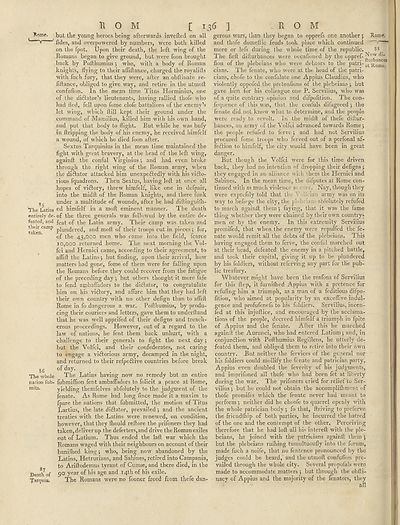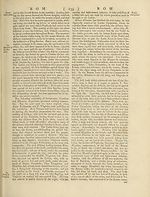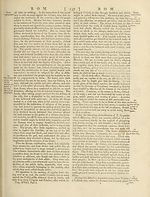Encyclopaedia Britannica, or, a Dictionary of arts, sciences, and miscellaneous literature : enlarged and improved. Illustrated with nearly six hundred engravings > Volume 18, RHI-SCR
(144) Page 136
Download files
Complete book:
Individual page:
Thumbnail gallery: Grid view | List view

Rome.
, *5 .
The Latins
entirely de¬
feated, and
their camp
taken.
S6
The whole
ration fub-
mits.
87 ,
Death of
Tarquin.
ROM [1
but the young heroes being afterwards invefted on all
tides, and overpowered by numbers, were both killed
on the fpot. Upon their death, the left wing of the
Romans began to give ground, but were foon brought
back by Polthumius j who, with a body of Roman
knights, flying to their afliftance, charged the royalifts
with fuch fury, that they were, after an obflinate re-
fiftance, obliged to give way, and retire in the utmolf
confufion. In the mean time Titus Horminius, one
of the diftator’s lieutenants, having rallied thofe who
had fled, fell upon fome clofe battalions of the enemy’s
let wing, which ftill kept their ground under the
command of Mamilius, killed him with his own hand,
and put that body to flight. But while he was bufy
in {tripping the body of his enemy, he received himfelf
a wound, of which he died foon after.
Sextus Tarquinius in the mean time maintained the
fight with great bravery, at the head of the left wing,
againft the conful Virginias; and had even broke
through the right wing of the Roman army, when
the dictator attacked him unexpectedly with his victo¬
rious fquadrons. Then Sextus, having lofl; at once all
hopes of victory, threw himfelf, like one in defpair,
into the midft of the Roman knights, and there funk
under a multitude of wounds, after he had diftinguifh-
ed himfelf in a mofi: eminent manner. The death
of the three generals was followed by the entire de¬
feat of the Latin army. Their camp was taken and
plundered, and moft of their troops cut in pieces; for,
of the 43,000 men who came into the field, fcarce
10,000 returned home. The next morning the Vol-
fci and Hernici came, according to their agreement, to
aflift the Latins j but finding, upon their arrival, how
matters had gone, fome of them rvere for falling upon
the Romans before they could recover from the fatigue
of the preceding day ; but others thought it more fafe
to fend ambaffadors to the diclator, to congratulate
him on his viClory, and aflure him that they had left
their own country with no other defign than to aflift
Rome in fo dangerous a war. Pofthumius, by produ¬
cing their couriers and letters, gave them to underftand
that he wTas wrell apprifed of their defigns and treach¬
erous proceedings. However, out of a regard to the
law of nations, he fent them back unhurt, with a
challenge to their generals to fight the next day •,
but the Volfci, and their confederates, not caring
to engage a victorious army, decamped in the night,
and returned to their refpeClive countries before break
of day.
The Latins having now no remedy but an entire
fubmiflion fent ambaffadors to folicit a peace at Rome,
yielding themfelves abfolutely to the judgment of the
fenate. As Rome had long fince made it a maxim to
fpare the nations that fubmitted, the motion of Titus
Lartius, the late dictator, prevailed ; and the ancient
treaties with the Latins were renewed, on condition,
however, that they flrould reftore the prifoners they had
taken, deliver up the deferters, and drive the Roman exiles
out of Latium. Thus ended the lafl: war which the
Romans waged with their neighbours on account of their
banifhed king *, who, being now abandoned by the
Latins, Hetrurians, and Sabines, retired into Campania,
to Ariftodemus tyrant of Cumae, and there died, in the
90 year of his age and 14th of his exile.
The Romans were no fooner freed from thefe dan-
Roine1,
SS
New di-
36 ] . It O M
gerous w'ars, than they began to opprefs one another;
and thofe domeftic feuds took place which continued
more or lefs during the whole time of the republic.
The firfi: difturbances were occafioned by the oppref-^ ^ancej
lion of the plebeians who were debtors to the patri-Rome. ;
cians. The fenate, who w'ere at the head of the patri¬
cians, chofe to the confulate one Appius Claudius, w’ho
violently oppofed the pretenfions of the plebeians j but
gave him for his colleague one P. Servilius, who was
of a quite contrary opinion and difpofition. The corn-
fequence of this was, that the confuls difagreed 5 the
fenate did not know what to determine, and the people
were ready to revolt. In the midft of thefe diftur¬
bances, an army of the Volfci advanced towards Rome;
the people refufed to ferve; and had not Servilius
procured fome. troops who ferved out of a perfonal af-
feCtion to himfelf, the city would have been in great
danger.
But though the Volfci ■were for this time driven
back, they had no intention of dropping their defigns;
they engaged in an alliance with them the Hernici and
Sabines. In the mean time, the difputes at Rome con¬
tinued with as much violence as ever. Nay, though they
were exprefsly told that the Volfcian army was on its
way to befiege the city, the plebeians abfolutely refufed
to march againfl: them ; faying, that it was the fame
thing whether they were chained by their own country^-
men or by the enemy. In this extremity Servilius
promifed, that when the enemy were repulfed the fe¬
nate would remit all the debts of the plebeians. This
having engaged them to ferve, the conlul marched out
at their head, defeated the enemy in a pitched battle,
and took their capital, giving it up to be plundered
by his foldiers, without referving any part for the pub¬
lic treafury.
Whatever might have been the reafons of Servilius
for this ftep, it furniflied Appius with a pretence for
refufing him a triumph, as a man of a feditious diipo-
fition, who aimed at popularity by an exceflive indul¬
gence and profufenefs to his foldiers. Servilius, incen-
fed at this injuftice, and encouraged by the acclama¬
tions of the people, decreed himfelf a triumph in fpite
of Appius and the fenate. After this he marched
againfl the Aurunci, who had entered Latium; and, in
conjunUion with Pofthumius Regillens, he utterly de¬
feated them, and obliged them to retire into their own
country. But neither the fervices of the gc reral nor
Ins foldiers could mollify the fenate and patrician party.
Appius even doubled the feverity of his judgments,
and imprifoned all thofe who had been fet at liberty
during the war. The prifoners cried for relief to Ser¬
vilius ; but he could not obtain the accomplilhment of
thofe promifes which the fenate never had meant to
perform ; neither did he choofe to quarrel openly with
the whole patrician body ; fo that, ftriving to preferve
the friendftiip of both parties, he incurred the hatred
of the one and the contempt of the other. Perceiving
therefore that he had loft all his intereft with the ple¬
beians, he joined with the patricians againft them ;
but the plebeians ruffing tmnultuoufly into the forum,
made fuch a noife, that no fentence pronounced by the
judges could be heard, and the utmoft confufion pre¬
vailed through the whole city. Several propofals were
made to accommodate matters ; but through the obfti-
nacv of Appius and the majority of the fenators, they
all
, *5 .
The Latins
entirely de¬
feated, and
their camp
taken.
S6
The whole
ration fub-
mits.
87 ,
Death of
Tarquin.
ROM [1
but the young heroes being afterwards invefted on all
tides, and overpowered by numbers, were both killed
on the fpot. Upon their death, the left wing of the
Romans began to give ground, but were foon brought
back by Polthumius j who, with a body of Roman
knights, flying to their afliftance, charged the royalifts
with fuch fury, that they were, after an obflinate re-
fiftance, obliged to give way, and retire in the utmolf
confufion. In the mean time Titus Horminius, one
of the diftator’s lieutenants, having rallied thofe who
had fled, fell upon fome clofe battalions of the enemy’s
let wing, which ftill kept their ground under the
command of Mamilius, killed him with his own hand,
and put that body to flight. But while he was bufy
in {tripping the body of his enemy, he received himfelf
a wound, of which he died foon after.
Sextus Tarquinius in the mean time maintained the
fight with great bravery, at the head of the left wing,
againft the conful Virginias; and had even broke
through the right wing of the Roman army, when
the dictator attacked him unexpectedly with his victo¬
rious fquadrons. Then Sextus, having lofl; at once all
hopes of victory, threw himfelf, like one in defpair,
into the midft of the Roman knights, and there funk
under a multitude of wounds, after he had diftinguifh-
ed himfelf in a mofi: eminent manner. The death
of the three generals was followed by the entire de¬
feat of the Latin army. Their camp was taken and
plundered, and moft of their troops cut in pieces; for,
of the 43,000 men who came into the field, fcarce
10,000 returned home. The next morning the Vol-
fci and Hernici came, according to their agreement, to
aflift the Latins j but finding, upon their arrival, how
matters had gone, fome of them rvere for falling upon
the Romans before they could recover from the fatigue
of the preceding day ; but others thought it more fafe
to fend ambaffadors to the diclator, to congratulate
him on his viClory, and aflure him that they had left
their own country with no other defign than to aflift
Rome in fo dangerous a war. Pofthumius, by produ¬
cing their couriers and letters, gave them to underftand
that he wTas wrell apprifed of their defigns and treach¬
erous proceedings. However, out of a regard to the
law of nations, he fent them back unhurt, with a
challenge to their generals to fight the next day •,
but the Volfci, and their confederates, not caring
to engage a victorious army, decamped in the night,
and returned to their refpeClive countries before break
of day.
The Latins having now no remedy but an entire
fubmiflion fent ambaffadors to folicit a peace at Rome,
yielding themfelves abfolutely to the judgment of the
fenate. As Rome had long fince made it a maxim to
fpare the nations that fubmitted, the motion of Titus
Lartius, the late dictator, prevailed ; and the ancient
treaties with the Latins were renewed, on condition,
however, that they flrould reftore the prifoners they had
taken, deliver up the deferters, and drive the Roman exiles
out of Latium. Thus ended the lafl: war which the
Romans waged with their neighbours on account of their
banifhed king *, who, being now abandoned by the
Latins, Hetrurians, and Sabines, retired into Campania,
to Ariftodemus tyrant of Cumae, and there died, in the
90 year of his age and 14th of his exile.
The Romans were no fooner freed from thefe dan-
Roine1,
SS
New di-
36 ] . It O M
gerous w'ars, than they began to opprefs one another;
and thofe domeftic feuds took place which continued
more or lefs during the whole time of the republic.
The firfi: difturbances were occafioned by the oppref-^ ^ancej
lion of the plebeians who were debtors to the patri-Rome. ;
cians. The fenate, who w'ere at the head of the patri¬
cians, chofe to the confulate one Appius Claudius, w’ho
violently oppofed the pretenfions of the plebeians j but
gave him for his colleague one P. Servilius, who was
of a quite contrary opinion and difpofition. The corn-
fequence of this was, that the confuls difagreed 5 the
fenate did not know what to determine, and the people
were ready to revolt. In the midft of thefe diftur¬
bances, an army of the Volfci advanced towards Rome;
the people refufed to ferve; and had not Servilius
procured fome. troops who ferved out of a perfonal af-
feCtion to himfelf, the city would have been in great
danger.
But though the Volfci ■were for this time driven
back, they had no intention of dropping their defigns;
they engaged in an alliance with them the Hernici and
Sabines. In the mean time, the difputes at Rome con¬
tinued with as much violence as ever. Nay, though they
were exprefsly told that the Volfcian army was on its
way to befiege the city, the plebeians abfolutely refufed
to march againfl: them ; faying, that it was the fame
thing whether they were chained by their own country^-
men or by the enemy. In this extremity Servilius
promifed, that when the enemy were repulfed the fe¬
nate would remit all the debts of the plebeians. This
having engaged them to ferve, the conlul marched out
at their head, defeated the enemy in a pitched battle,
and took their capital, giving it up to be plundered
by his foldiers, without referving any part for the pub¬
lic treafury.
Whatever might have been the reafons of Servilius
for this ftep, it furniflied Appius with a pretence for
refufing him a triumph, as a man of a feditious diipo-
fition, who aimed at popularity by an exceflive indul¬
gence and profufenefs to his foldiers. Servilius, incen-
fed at this injuftice, and encouraged by the acclama¬
tions of the people, decreed himfelf a triumph in fpite
of Appius and the fenate. After this he marched
againfl the Aurunci, who had entered Latium; and, in
conjunUion with Pofthumius Regillens, he utterly de¬
feated them, and obliged them to retire into their own
country. But neither the fervices of the gc reral nor
Ins foldiers could mollify the fenate and patrician party.
Appius even doubled the feverity of his judgments,
and imprifoned all thofe who had been fet at liberty
during the war. The prifoners cried for relief to Ser¬
vilius ; but he could not obtain the accomplilhment of
thofe promifes which the fenate never had meant to
perform ; neither did he choofe to quarrel openly with
the whole patrician body ; fo that, ftriving to preferve
the friendftiip of both parties, he incurred the hatred
of the one and the contempt of the other. Perceiving
therefore that he had loft all his intereft with the ple¬
beians, he joined with the patricians againft them ;
but the plebeians ruffing tmnultuoufly into the forum,
made fuch a noife, that no fentence pronounced by the
judges could be heard, and the utmoft confufion pre¬
vailed through the whole city. Several propofals were
made to accommodate matters ; but through the obfti-
nacv of Appius and the majority of the fenators, they
all
Set display mode to:
![]() Universal Viewer |
Universal Viewer | ![]() Mirador |
Large image | Transcription
Mirador |
Large image | Transcription
Images and transcriptions on this page, including medium image downloads, may be used under the Creative Commons Attribution 4.0 International Licence unless otherwise stated. ![]()
| Permanent URL | https://digital.nls.uk/193020579 |
|---|
| Attribution and copyright: |
|
|---|
| Description | Ten editions of 'Encyclopaedia Britannica', issued from 1768-1903, in 231 volumes. Originally issued in 100 weekly parts (3 volumes) between 1768 and 1771 by publishers: Colin Macfarquhar and Andrew Bell (Edinburgh); editor: William Smellie: engraver: Andrew Bell. Expanded editions in the 19th century featured more volumes and contributions from leading experts in their fields. Managed and published in Edinburgh up to the 9th edition (25 volumes, from 1875-1889); the 10th edition (1902-1903) re-issued the 9th edition, with 11 supplementary volumes. |
|---|---|
| Additional NLS resources: |
|

